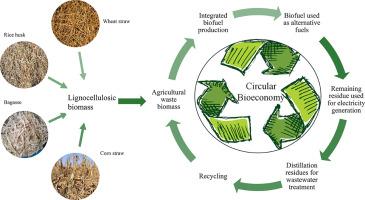利用稻壳:为可持续未来生产生物乙醇
IF 4.8
Q1 MICROBIOLOGY
引用次数: 0
摘要
利用稻壳生产生物燃料的研究突出表明,在环境问题日益严重和化石燃料逐渐丧失的情况下,稻壳具有作为可持续能源的潜力。生物质衍生生物燃料,特别是从稻壳等木质纤维素材料中提取的生物燃料,提供了一种可持续和环保的替代能源,既能减少温室气体排放,又能提高能源安全。本综述探讨了生产生物燃料的必要性、生物燃料技术的四代进展以及稻壳转化生物乙醇的具体机制。利用稻壳生产生物乙醇有几个重要阶段,包括破坏木质纤维素结构(称为预处理)、将复杂的碳水化合物结构水解为可发酵的糖、利用合适的微生物发酵生产乙醇,以及通过蒸馏提纯最终产品。尽管取得了重大进展,但这些系统在成本效益和效率方面仍面临挑战。预处理技术通常需要消耗大量能源;木质素的数量会影响水解效果,而且必须仔细调整发酵过程以提高产量。这项研究强调了继续研究和进步以消除这些障碍的必要性。要提高稻壳生物乙醇生产的效率和成本效益,必须改进预处理技术、酶的应用和发酵程序。通过强调这些领域,稻壳作为一种有价值的生物燃料来源的潜在利用价值将有助于实现长期能源目标,同时降低能源生产对环境的负面影响。本文章由计算机程序翻译,如有差异,请以英文原文为准。

Harnessing rice husks: Bioethanol production for sustainable future
The investigation of biofuel production from rice husks highlights its potential as a sustainable energy source amid rising environmental concerns and the gradual loss of fossil fuel sources. Biomass-derived biofuels, notably those derived from lignocellulosic materials, such as rice husks, provide a sustainable and environmentally friendly alternative that reduces greenhouse gas emissions while improving energy security. This review explores the need to produce biofuels along with the progression of biofuel technology throughout the four generations and the specific mechanisms involved in the conversion of bioethanol from rice husks. Several important stages are essential for the production of bioethanol from rice husks, including the disruption of lignocellulosic structure known as pretreatment, hydrolysis of complex carbohydrate structures into fermentable sugars, fermentation utilizing suitable microorganisms to produce ethanol, and purification of the end product by distillation. Despite significant advances, these systems still encounter challenges in terms of their cost-effectiveness and efficiency. Pretreatment techniques generally require considerable amounts of energy; the quantity of lignin influences hydrolysis effectiveness, and the process of fermentation must be carefully adapted for higher yields. This study emphasizes the need for continuing research and advancements to eliminate these obstacles. Improvements in pretreatment technologies, enzymatic applications, and fermentation procedures are essential to enhance the efficiency and cost-effectiveness of rice husk bioethanol production. By emphasizing these areas, rice husks' potential utilization as a valuable biofuel source could assist in achieving long-term energy goals while lowering the negative environmental impact of energy generation.
求助全文
通过发布文献求助,成功后即可免费获取论文全文。
去求助
来源期刊

Current Research in Microbial Sciences
Immunology and Microbiology-Immunology and Microbiology (miscellaneous)
CiteScore
7.90
自引率
0.00%
发文量
81
审稿时长
66 days
 求助内容:
求助内容: 应助结果提醒方式:
应助结果提醒方式:


